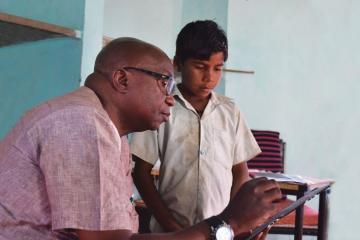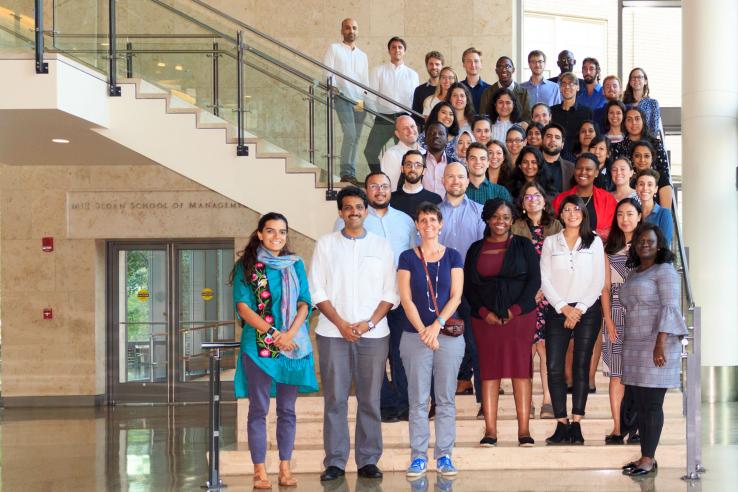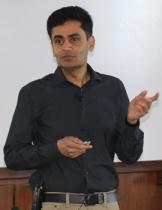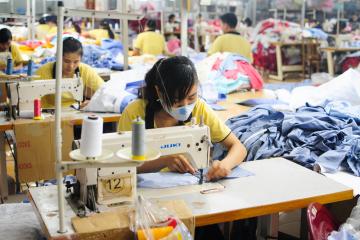
2018 in review: A letter from our Executive Director

I am often asked during the year “how are things at J-PAL?” My frank reply usually is “busy, but good busy!” As the new year begins, I’d like to share a few things that made 2018 “good busy” for J-PAL, and a few more that we’re excited about in 2019.
- We launched two new sectors—Gender and Firms—to synthesize existing evidence and spur new research on highly relevant questions such as how gender norms affect the outcomes of social programs and how growth in the private sector affects worker wellbeing, the environment, and the economy.
- We announced three new research initiatives: At our Europe office, the European Social Inclusion Initiative focuses on programs affecting migrants and refugees; at our North America office, the Education, Technology, and Opportunity Initiative focuses on educational innovation, and the Work of the Future Innovation Competition focuses on the changing nature of work.
- We launched new government partnerships to scale up effective programs to reach many more people, including our Africa office’s partnership focused on the “Teaching at the Right Level” approach that helps students catch up to their grade level in Côte d’Ivoire and other African countries. Our South Asia office’s partnership focusing on the “Graduation” approach equips people to lift themselves out of poverty in Bihar, India. Our Southeast Asia office worked to strengthen existing government partnerships through a series of workshops with the Indonesian Ministry of National Development Planning.
- We kicked off a new regional partnership with the American University in Cairo that will facilitate crucial research, policy, and capacity building work in Egypt, expanding our reach in the Middle East and North Africa region.
- We just opened admissions for a new “blended” Master’s degree in Data, Economics, and Development Policy that combines online and in-person classes at MIT’s economics department to train students from around the world in the skills needed to create social and economic change.
- We created a new Evidence to Policy section on our website to highlight the many ways in which randomized evaluations influence policy and practice. And our new Policy Insights library provides summaries of lessons from multiple studies to help decision-makers access relevant evidence and key recommendations that serve as practical inputs for policy and program design.
- We published papers to share key lessons in specific areas of research and policy. Creating a Culture of Evidence Use highlights lessons in strengthening partnerships to encourage evidence-informed policy among governments in Latin America and the Caribbean. A Practical Guide to Measuring Women’s and Girls’ Empowerment in Impact Evaluations offers practical tips for evaluators, researchers, and students examining gender and empowerment outcomes.
J-PAL’s vision remains the same: greater use of data and rigorous evidence in decision-making. Toward that vision, we are looking forward to what 2019 holds for us:
- Research initiatives at our regional offices and the ten sector programs, including existing ones like Environment, Crime, and Labor, as well as the new Firms and Gender sectors, will enable innovative research to fill critical gaps in knowledge.
- We will relaunch our Government Partnership Initiative as the Innovation in Government (IGI) Initiative, representing renewed efforts to scale up effective programs to reach more people. We also hope to launch a new Innovations in Data and Experiments for Action (IDEA) Initiative to help researchers and data providers access and analyze large administrative datasets to inform decision-making and run experiments that may be cheaper and faster.
- We are building the next generation of evidence-driven leaders through custom courses run by our regional offices and an expanding suite of online education in hard-to-reach places, like refugee camps.
Everything we have achieved at J-PAL is due to the support of our incredible partners, affiliates, and staff: Our funding partners provide the vision and resources that allow us to grow and expand our work, our implementing partners put faith in us to evaluate and learn from pilot programs before scaling up, and the creativity of our affiliated professors pushes us into new research frontiers.
In 2018 our staff count exceeded 400 worldwide for the first time. I’d like to very gratefully acknowledge the incredible hard work and commitment of these unsung heroes of J-PAL who support our work in communications, education, finance, operations, policy, research, and training. Thank you for everything you do.
On a personal note, this is my tenth year at J-PAL and my first as its Executive Director. I’m grateful to all our funding and policy partners, affiliates, and staff who made the time to meet with me and share their feedback during my “listen and learn” visits. We are working hard to incorporate these suggestions into our work.
At J-PAL, we believe that rigorous evidence can help inform decisions—from rural communities to the halls of government offices—to improve people’s lives. We’re grateful to everyone who has joined us on this journey.


